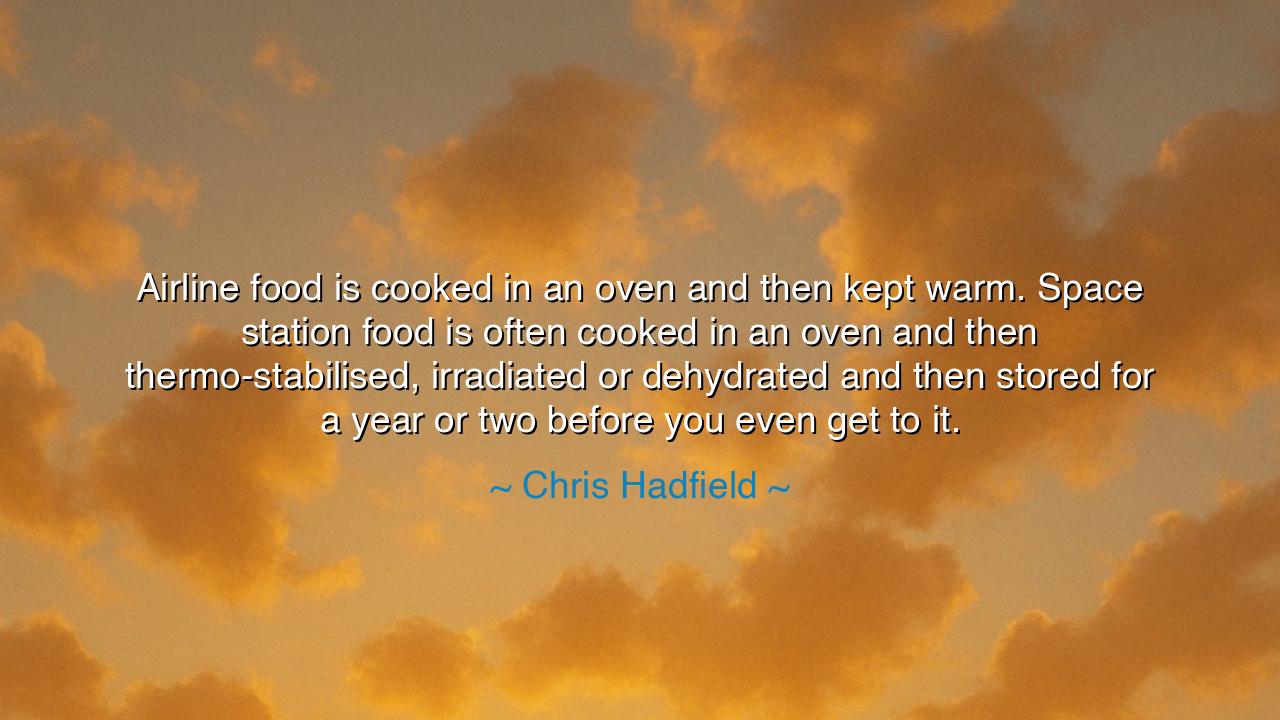
Airline food is cooked in an oven and then kept warm. Space
Airline food is cooked in an oven and then kept warm. Space station food is often cooked in an oven and then thermo-stabilised, irradiated or dehydrated and then stored for a year or two before you even get to it.






Hear the words of Chris Hadfield, astronaut and teacher of the stars, who declared: “Airline food is cooked in an oven and then kept warm. Space station food is often cooked in an oven and then thermo-stabilised, irradiated or dehydrated and then stored for a year or two before you even get to it.” At first glance, his words seem practical, even mundane, a simple explanation of meals beyond the earth. Yet hidden within them lies a profound reflection on human adaptation, endurance, and the cost of exploration. For food, the daily ritual of survival, becomes a mirror of the larger truth: that to reach the heavens, man must transform the ordinary into the extraordinary, and pay the price of patience and sacrifice.
The origin of this thought lies in the reality of life aboard the International Space Station. Astronauts cannot stroll to a market or harvest from a field; every morsel must be prepared, preserved, and guarded with care. Thus, what on earth is simple—cooking—in orbit becomes a triumph of science. Irradiated meals, sealed packages, dehydrated fruits, these are not luxuries but necessities, for in the void of space, food must endure as long as the mission, immune to rot, resistant to spoilage. Hadfield’s words remind us that in the pursuit of greatness, even the act of eating demands ingenuity and endurance.
And yet, there is wisdom beyond science in his words. They teach us that the sweetness of life is often diminished when comfort must give way to necessity. The astronaut who opens a pouch of preserved stew does not taste what the earthbound traveler tastes in fresh bread and ripe fruit. But he accepts this with grace, for he has traded comfort for purpose. Here lies a truth for all of us: that the noblest paths often ask us to surrender ease in exchange for vision, to forego the fresh in order to reach the infinite.
History too speaks of this sacrifice. Think of the great explorers—Magellan, Shackleton, and countless others—who carried with them salted meats, hardtack, and dried grains. These were no feasts, but rations meant to last months upon uncharted seas. Their food, like Hadfield’s in orbit, was not chosen for taste but for survival. Shackleton’s men, stranded upon the ice, survived on meager stores and hunted seals, and though their meals were harsh, their spirits were strengthened by the knowledge that endurance was their only path home. So too, in the heavens, astronauts endure blandness and delay to serve the greater cause of human expansion.
The meaning of Hadfield’s words is both humble and heroic. He does not speak of grand conquests or battles among the stars; he speaks of meals, of the small details that make great endeavors possible. And in doing so, he reminds us that greatness is never built on glory alone, but upon countless small sacrifices accepted without complaint. Even something as simple as a meal, when offered to the mission, becomes part of the heroic tapestry of exploration.
The lesson for us is clear: do not despise the small inconveniences that accompany your higher purpose. To build a dream, you may eat meals that are plain, endure tasks that are tedious, or wait years for a harvest of joy. These are your thermo-stabilised rations, the preserved food of the spirit, carried with you until the day you can feast upon your reward. Accept them with gratitude, for they are proof that you are upon a journey worth the cost.
Practical actions flow from this wisdom. In your own life, when you find yourself enduring monotony or sacrificing comfort, remember Hadfield’s words. Remind yourself that every dehydrated fruit, every preserved moment of patience, is nourishment for the future. Treat small sacrifices not as punishments, but as investments. When you are tempted to complain of life’s blandness, recall that even the astronaut eats in patience to serve a greater cause. And in this way, transform frustration into purpose.
Thus, Chris Hadfield’s words about space station food become more than commentary on diet—they become a parable of endurance. They teach us that to reach the stars, one must accept not only the glory of flight but the discipline of patience, the humility of sacrifice, and the wisdom of finding meaning even in the simplest of meals. Let us then live with this spirit: grateful for the bread before us, but willing to endure rations when the mission demands, for the sake of the future that waits beyond the horizon.






AAdministratorAdministrator
Welcome, honored guests. Please leave a comment, we will respond soon